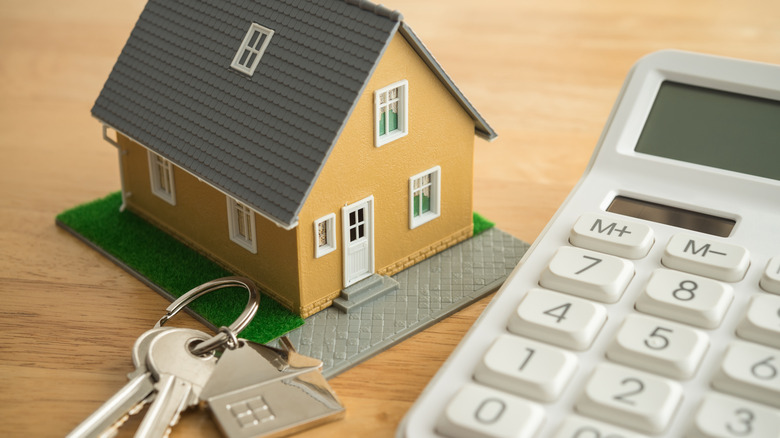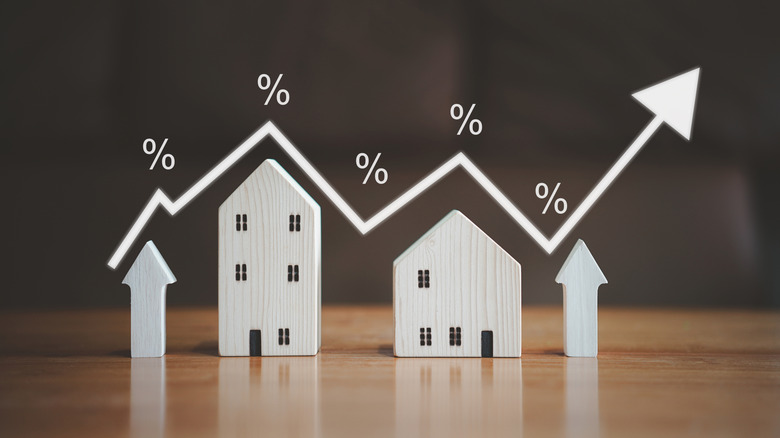The Big Payment You Should Try To Make Before Inauguration Day 2025
Among the many promises made on the campaign trail in 2024, lowering interest rates was a priority for many voters. From not being able to afford a new mortgage to facing record-high monthly payments for new vehicles, high interest rates have made making necessary financial decisions harder than ever for many Americans. However, even before inauguration day has arrived there are already clear signs that many of the proposed policies of Donald Trump's second term are directly at odds with his campaign promises. Chief among them, lowering interest rates. From imposing tariffs (which you, as a consumer, will ultimately pay for) to decreasing taxes for the wealthy, inflation (and therefore interest rates) is instead predicted to stay high and, even worse, more unpredictable.
While interest rates affect multiple different elements of consumers' lives, mortgage rates in particular have made it harder to buy and/or sell homes, which further contributes to the country's growing housing crisis. Mortgages in particular could face a rough 2025, despite many voters' hopes. As Lisa Sturtevant, chief economist with Bright MLS, told the Associated Press, "Trump's fiscal policies can be expected to lead to rising and more unpredictable mortgage rates [...] into 2025." While this can clearly affect those who were hoping to buy in the new year, those who are already homeowners could also be facing troubling financial consequences of Trump's policies. While chances are good you are not able to entirely pay off your mortgage before January 20, 2025 (inauguration day) you might want to consider paying your mortgage down.
Paying down your mortgage
With mortgage rates set to increase (as of January 2025, mortgage rates have already climbed to their highest point since July 2024 at 6.93% for a 30-year fixed-rate mortgage), those with floating or variable-loan rates should consider acting fast. Paying down your mortgage, as much as you are financially able to, before inauguration day could help you avoid some of the added costs of the increased interest rates that are on their way. Stuart Schiffman, founder of Compound Wealth Advisors, told GOBanking Rates, "It is best to pay these obligations down or convert them to fixed rates." Avoiding certain loan types that can damage your financial future is important, and adjustable rate mortgages are definitely one of the top types to avoid. Since interest rates are due to spike again in 2025, it could be worth converting your mortgage to a fixed rate or paying down your principal as much as you can before Donald Trump takes office.
It's also worth keeping in mind that if you were hoping to buy or sell a home in 2025, you might want to wait. According to Taylor Rogers, a spokesperson for the Trump-Vance transition team, "President Trump will deliver on his promise to Make Housing Affordable Again by defeating historic inflation and reducing the mortgage rate." However, Rogers went on to say that Trump would accomplish this by deporting illegal immigrants, eliminating federal regulations, and opening portions of federal land to developers — all proposals that are unlikely to have a positive effect on the housing market.
How mortgage rates are determined
It's important to realize that several different factors are at play when it comes to mortgage rates, beyond the Fed determined federal rate. Some factors are more tangible, such as the 10-year yield in U.S. Treasury bonds while others are more complicated, like the current strength of the U.S. economy. However, that strength is mainly what is in question when it comes to Donald Trump's proposed policies. Both Trump's plans to impose wide sweeping tariffs (he has proposed a 25% tariff on goods from Canada and Mexico, plus an additional 10% on Chinese goods), as well as his proposed mass deportations of undocumented immigrants could serve to significantly increase inflation (not to mention how these deportations could ultimately affect Social Security).
Goldman Sachs chief economist, Jan Hatzius, estimated in a note to clients "that the proposed tariff increases would boost core PCE prices by 0.9% if implemented." PCE or the personal consumption expenditures price index is the preferred inflation measure for the Fed. All of this is to say, inflation could see an almost entire 1% spike just from Trump's tariff policy alone. This inflation spike could lead the Fed to either slow down or even stop future rate cuts altogether, which would leave interest rates high for Americans hoping for a break. Plus, in addition to rising inflation, Trump's tax cuts and business deregulation could also serve to increase the country's national deficit, and by a lot. This would then cripple future generations who will ultimately be left with the consequences of that debt.


